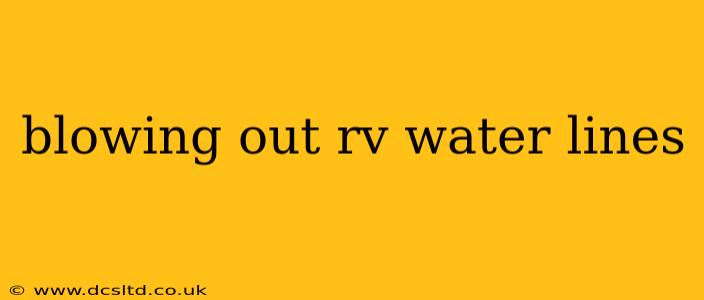Winterizing your RV is crucial to prevent costly damage from freezing water lines. One of the most effective methods is blowing out your RV's water lines using compressed air. This guide will walk you through the process, addressing common questions and concerns. Properly blowing out your water lines protects your investment and ensures a smooth start to your next camping season.
Why Blow Out RV Water Lines?
Freezing water expands, putting immense pressure on your RV's plumbing system. This pressure can cause pipes to burst, leading to significant damage and expensive repairs. Blowing out your lines removes all water, preventing freezing and the potential for catastrophic failure. This is far more effective and less costly than potential repairs.
What Equipment Do I Need to Blow Out RV Water Lines?
You'll need a few essential pieces of equipment to effectively blow out your RV's water lines:
- Air Compressor: A portable air compressor capable of delivering at least 90 PSI is recommended. Higher PSI is generally better for ensuring complete water removal.
- Air Chuck with Blow Gun: This allows for precise control of the compressed air.
- Low-Pressure Regulator: A regulator is highly recommended to control the air pressure and prevent damage to your system. Aim for a maximum pressure between 30 and 40 PSI.
- Water Hose: A standard garden hose is sufficient.
- RV Antifreeze (optional): While blowing out the lines is the primary method, adding RV antifreeze offers an extra layer of protection.
How to Blow Out Your RV Water Lines: A Step-by-Step Guide
- Prepare your RV: Turn off all water pumps and disconnect your RV from any external water sources (city water hookup).
- Open all faucets: Open all faucets, including those in the kitchen, bathroom, and shower. This allows air to flow freely through the system.
- Locate your low-point drains: Open your RV's low-point drains (usually found under the RV). These allow any remaining water to drain completely.
- Connect the air compressor: Connect the air compressor's hose to the water inlet connection on your RV. This is typically located near the front of the RV.
- Attach the air chuck and blow gun: Securely attach the air chuck to the end of the air compressor hose and then attach the blow gun.
- Turn on the compressor and adjust pressure: Turn on the compressor and slowly increase the pressure using the regulator. Start low (around 30 PSI) to avoid damage and gradually increase it as needed. Never exceed 40 PSI.
- Monitor the faucets: As you blow air into the system, observe the faucets. Air should come out of all faucets indicating that water has been removed.
- Check for remaining water: Once air flows freely from all faucets, disconnect the compressor and carefully check the faucets again for any signs of water. If any water remains, repeat the process.
- Add RV antifreeze (optional): After blowing out the lines, consider adding RV antifreeze to provide extra protection against any residual moisture.
How Much Air Pressure Should I Use?
The optimal pressure is crucial. Excessive pressure can damage your plumbing system. Start with a lower pressure (around 30 PSI) and gradually increase it as needed, never exceeding 40 PSI. Consistent airflow from all faucets indicates successful water removal.
What if I Don't Have an Air Compressor?
If you don't own an air compressor, you can explore alternative winterizing methods, such as using compressed air from a service station or hiring a professional RV service center to winterize your RV.
Can I Use a Leaf Blower to Blow Out RV Water Lines?
While a leaf blower might seem like an alternative, it's not powerful enough to effectively remove all the water from your RV's plumbing system. It is not recommended.
How Often Should I Blow Out My RV Water Lines?
It's essential to blow out your RV water lines before every winter storage period. This practice ensures the longevity of your RV’s plumbing system, saving you from potential costly repairs.
What if I Hear Hissing Sounds While Blowing Out the Lines?
Hissing sounds might indicate a small leak in your system. Investigate the source of the sound and address any leak before proceeding.
By following this comprehensive guide, you can confidently blow out your RV water lines, protecting your investment from winter's harsh conditions. Remember to always prioritize safety and use the correct equipment and techniques.
